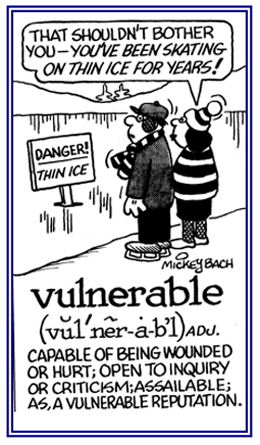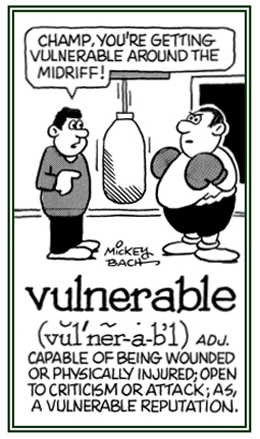-able
(Latin: a suffix; expressing capacity, fitness to do that which can be handled or managed, suitable skills to accomplish something; capable of being done, something which can be finished, etc.)
A suffix that forms adjectives. The suffix -ible has related meanings; expressing ability, capacity, fitness; capable of, fit for, able to be done, can be done, inclined to, tending to, given to.
This list is only a small sample of the thousands of -able words that exist in English.
2. Worthy of reverence, especially by religious or historical association: There were many venerable and antiquated relics to be seen in the church around the corner.
3. Referring to places, buildings, etc.; hallowed by religious, historic, or other lofty associations: On the tour of the abbey, June admired the venerable halls which were full of bygone days and brimming with tales of fate.
4. Venerable, abbreviated, Ven. or V., in the Roman Catholic Church and used as a form of address for an individual who has reached the first stage of canonization: Bishop Fulton J. Sheen and Princess Louise of France are two examples of Venerables.
5. Pertaining to a form of address for an archdeacon in the Anglican Church or the Episcopal Church: The venerable ecclesiastical dignitary had been assigned the lowest degrees of acknowledgement for sanctitude.
6. Impressive or interesting because of age, antique appearance, etc.: The old and venerable grandfather clock stood at a special spot in the living room.
There was a venerable oak tree in the family's garden.
7. Extremely old or obsolete or ancient: Thomas remembered that there was a venerable and timeworn house which had been taken down many, many years ago.
2. Concerning the possibility of talking about feelings or ideas openly: After the funeral, the family and friends had ventilable thoughts, memories, and emotions that they needed to share with each other.
2. Susceptible to being tested by observation or experimentation: The demonstrations the students prepared for the biology class were verifiable, because they were all proven to have the exact same results.
2. Used as an intensifier regarding someone or something: At last Tom's team reached the veritable peak of success by wining the last baseball match of the season
2. Able to maintain an independent existence or able to live and develop: The viable seedlings were sown in the garden and were soon growing into big zucchini plants.
3. Eligible of success, or continuing effectiveness; practicable: The bank said that the plan for starting John's business was viable and could be carried out successfully.
Viable was originally restricted to the senses of "able to grow" and "able to survive", as in a viable fetus.
Its extended sense of "able to be done" or "worth doing", as in "viable alternatives", is now well established and acceptable in the English language.
2. A descriptive term referring to someone who can be injured or killed: The family traveling by car in the heavy snowstorm was in great danger and victimizable due to driving off the road and crashing into a tree.
2. Prone to be broken or injured: The antique and very thin cup and saucer were quite violable, so Mrs. Scott put them into the cupboard to keep them from being cracked or smashed to bits!
2. In law, capable of being made or adjudged to be no longer legally binding: A marriage can be voidable when two people have never lived together and have not had any relationship with other.
2. Relating to being unable to resist illness, debility, or physical failure because of physical or psychological weakness: There are some vulnerable people in danger of getting the influenza because they have not yet been inoculated for the disease.
3. Open to censure or criticism; assailable: Hank's sister has always been vulnerable to criticism.
4. Capable of being exposed to a military attack or possible damage: While James was in the army and he and his fellow soldiers were in a vulnerable position, they were able to survive an onslaught by enemy forces.
5. Etymology: from Late Latin vulnerabilis, "wounding"; from Latin vulnerare, "to wound"; from vulnus, vulneris, "wound".



